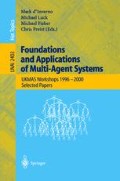Abstract
Game Theory and Artificial Intelligence are two mature areas of research, originating from similar roots, which have taken different research directions in the last 50 years. Recent research however shows that the connections between these areas are deep, and that the time had come for bridging the gap between these research disciplines. In this paper we concentrate on basic issues in representation, reasoning, and learning, and discuss work that lies in the intersection of Artificial Intelligence and Game Theory, for each of these subjects.
Access this chapter
Tax calculation will be finalised at checkout
Purchases are for personal use only
Preview
Unable to display preview. Download preview PDF.
References
Allan Borodin and Ran El-Yaniv. On-Line Computation and Competitive Analysis. Cambridge University Press, 1998.
C. Boutilier, T. Dean, and S. Hanks. Decision Theoretic Planning: Structural Assumptions and Computational Leverage. Journal of Artificial Intelligence Research, 11:1–94, 1999.
R. Brafman and M. Tennenholtz. R-max — A General Polynomial Time Algorithm for Near-Optimal Reinforcement Learning. In Proc. of the 17th International Joint Conference on Artificial Intelligence, pages 953–958, 2001.
R. I. Brafman and M. Tennenholtz. An axiomatic treatment of three qualitative decision criteria. Journal of the ACM, 47(3), March 2000.
E. Clarke. Multipart pricing of public goods. Public Choice, 18:19–33, 1971.
I. Erev and A.E. Roth. Predicting how people play games: Reinforcement learning in games with unique strategy equilibrium. American Economic Review, 88:848–881, 1998.
R. Fagin, J. Y. Halpern, Y. Moses, and M. Y. Vardi. Reasoning about Knowledge. MIT Press, 1995.
D. Fudenberg and D. Levine. The theory of learning in games. MIT Press, 1998.
L. P. Kaelbling, M. L. Littman, and A. W. Moore. Reinforcement learning: A survey. Journal of AI Research, 4:237–285, 1996.
S. Kraus. Negotiation and cooperation in multi-agent environments. Artificial Intelligence, 94:79–97, 1997.
A. Neyman. Bounded complexity justifies cooperation in the infinitely repeated prisoner’s dilemma. Econ. Lett., 19:227–229, 1985.
M.L. Puterman. Markov Decision Processes: Discrete Stochastic Dynamic Programming. Wiley, 1994.
Holzman R, Noa Kfir-Dahav, Dov Monderer, and Moshe Tennenholtz. Bundling Equilibrium in Combinatorial Auctions. Working paper Technion http://ie.technion.ac.il/dov/rndm6.pdf, 2001.
Jeffrey S. Rosenschein and Gilad Zlotkin. Rules of Encounter. MIT Press, 1994.
S. Russell and P. Norvig. Artificial Intelligence: A Modern Approach. Prentice Hall, 1995.
L.J. Savage. The Foundations of Statistics. John Wiley and Sons, New York, 1954. Revised and enlarged edition, Dover, New York, 1972.
L.S. Shapley. Stochastic Games. In Proc. Nat. Acad. Scie. USA, volume 39, pages 1095–1100, 1953.
R. S. Sutton and A. G. Barto. Reinforcement Learning: An Introduction. MIT Press, 1998.
M. Tennenholtz. Electronic commerce: From game-theoretic and economic models to working protocols. In IJCAI-99, 1999.
Author information
Authors and Affiliations
Editor information
Editors and Affiliations
Rights and permissions
Copyright information
© 2002 Springer-Verlag Berlin Heidelberg
About this paper
Cite this paper
Tennenholtz, M. (2002). Game Theory and Artificial Intelligence. In: d’Inverno, M., Luck, M., Fisher, M., Preist, C. (eds) Foundations and Applications of Multi-Agent Systems. Lecture Notes in Computer Science(), vol 2403. Springer, Berlin, Heidelberg. https://doi.org/10.1007/3-540-45634-1_4
Download citation
DOI: https://doi.org/10.1007/3-540-45634-1_4
Published:
Publisher Name: Springer, Berlin, Heidelberg
Print ISBN: 978-3-540-43962-2
Online ISBN: 978-3-540-45634-6
eBook Packages: Springer Book Archive

